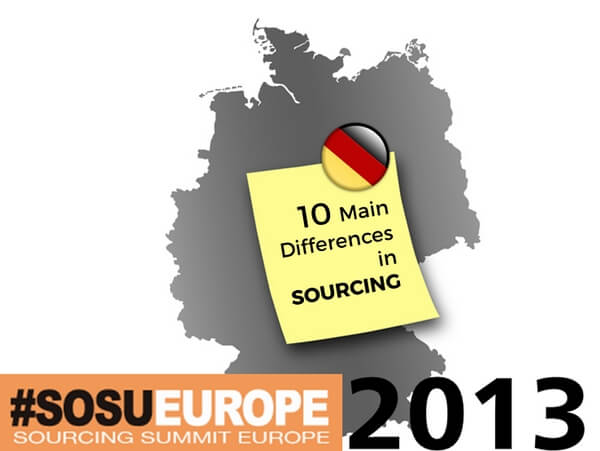To help to prepare the Sourcing Summit Europe 2013 here it comes – my blog article about Talent Sourcing in Germany. I hope to help my fellow sourcers to understand how practical sourcing is working in Germany. Just short about me: I am now a recruiter for 26 years, I started my career after I have studied at University in Bayreuth, Germany and Leeds University, UK the old fashioned way in industry. After 10 years as a personal manager I changed the sides and started to recruit and do consulting projects in two of the Top-Ten agencys in Germany. 2005 I founded Intercessio, first we started as an Executive Search Agency. Now for nearly 3 years we successfully train, coach, support companys and agencys to get the best benefit for their Human Resource by implement and adapt to Social Recruiting processes.
Inhaltsverzeichnis
The international Talent Sourcing Masterminds
I personally understood talent sourcing after I have attended my training at Socialtalent by Jonathan Campbell (Thanks for sharing so much knowledge). More trainings followed by Irina Shamaeva (People Sourcing Certifications) and Shelly Steckerl (The Sourcing Institute), Glen Cathey (formerly Ranstadt Bright Source, now Kforce). Two years ago having been in London first time watching Jonathan creating virtuously and so effective this English Boolean strings was very amazing for me. I never have thought before that this is possible. And I went happy and very excited back to the airport to have found a great way to improve my talent pool. But already on my way home I was sure: This will not work that way in Germany – unfortunatly.
Talent Sourcing in Germany
Why I thought this? The easiest reason is English Booleans with German words in German LinkedIn or German XING and German Google done by a not trained German recruiter– and the whole thing in German law surrounding is more than only a true challenge.
Here are 10 main reasons why:
#1 (Data) Security and Privacy
Laws for the protection of privacy have been adopted worldwide, but we in Germany are extremely sensible about data protection and data security and created a whole system of rules (here a summery in English).Too there are lots of additonal interpretations in business life. At the end very many recruiters have still no access to Social Media at their workplace, very many are not even allowed to use their smartphones. Therefore talking about social recruiting or talent sourcing is still for many a paradigm shift and a basic debate. (here an English article about that)
And due to this trend very many candidates do only put their social media profile on public setting if they are job seekers. This is the ‘felt’ and lived privacy in Germany.
And for instance: I am able to source now, experienced in training and coaching and I could show this by videos. But to do this is highly critical: To film a live sourcing session and put the data results online on Youtube. The reason is the personal data which is shown by the search engines: I would need a signed agreement of every signle of that people I have googled to show their data in a video which I use professionally.
#2 Labour Law
In addition we have an extreme strong labour law system. So there are very many things different in Germany by law, just some examples for my fellow sourcer colleques who are planning to source in Germany:
- We have a very dominant Federal Employment Office (Bundesagentur für Arbeit) which has a the greatest job board (Jobbörse) in Germany and therefore the biggest talent pool is free available for both: Job seekers and companys (you need to have a free registration) – people tend to rely on that.
- An email (with an advertisement aim) send to a person without having the allowance to do so is a Spam. Therefore to write an email to a person you do not know is likely ‘felt’ as not serious – you have to really think about what to write. A contact email is forbitten to the company email anyway without being able to prove that there is already an connection.
- But if you try to contact them in a Social Network you find out: There are not that many in Linkedin or the main German network: Xing – so how to get in contact?
- Just in brief: Contact in Germany is still mostly done the old traditional way by phoning or sending letters. And there is the next challenge in Executive Search in Germany: We are only allowed to call a potential candidate once for maximum 3 minutes as far as this person is in a office to try to talk to that candidate (even on his private phone). Try this – it’s not that easy.
#3 Language
But back to the beginning: Finding talents. I tried the Booleans with German words and they did not work properly. But I did not want to accept that as ‘not possible’. So I have consequently tested strings, functions, social networks, the web, German Google, German Bing , American Google, other German other search engines, all the different possibilities of German XING and German LinkedIn sourcing combinations. I tried tools of XING like the TalentManager. And I did this not only with my recruiting projects but asked my friends to give me more projects to test, just to have new ideas how it works.
My balance is now after nearly 2 years practical talent sourcing: 70 % of sourcing strings are working in Germany too – but not the same way as in English. You have to adapt to specialities:
- We have the following mutated vowels in our language ä, ü, ö. Sometimes people here spell them that way, sometimes they use ae, ue, oe. German Google accepts the mutated vowels but is not realiable onthat. Only in names of citys or brands. Therefore you have to search here in always that way: (München OR ‘Muenchen’ OR Munich OR Muc)
- We have an additional s, the ‘ß’ – this is used sometimes as a douple ss, sometimes as an ‘ß’. Especially the German word for ‘big’ = ‘groß’ is used very often in names for locations or in family names. Here is an example: Großhadern (That’s in Munic) (“Großhadern” OR Grosshadern OR Groshadern).If you do not take care about that ‘ß’ you very likely will miss German candidates.
# 4 Monsterwords
There is a remarkable German habit: We love to define things, to explain facts properly – by the way of building monsterwords. Here are some real and steadily used examples:
Versicherungsgesellschaft (Assurance company)
Energieversorgungsunternehmen (electrical supply company)
Lichtwellenleiterübertragungstechnik (optic fibre transmission technology)
And now please try the challenge to make a string with all the possible writings, rewritings and English or German versions of this job
‘Projekt Ingenieur Lichtwellenleiterübertragungstechnik für ein Energieversorgungsunternehmen in Großhadern’.
(optic fibre transmission technology project engineer for a electrical supply company in Großhadern)
# 5 Hyphen
Another darling of the German language: To help people and to ‘clearify’ or in addition or just instead of monsterwords people love to hyphenate words. If they start talent sourcing even Germans are surprised by their fellow recruiters about this artistic and creative way to build words. So hyphening is just another way to create mosterwords:
‘Projekt Ingenieur Lichtwellenleiter-Übertragungstechnik für ein Energieversorgungsunternehmen in Großhadern’.
‘Projekt-Ingenieur Lichtwellenleiterübertragungstechnik für ein Energie-Versorgungsunternehmen in Großhadern’.
‘Projektingenieur Lichtwellenleiter-Übertragungstechnik für ein Energieversorgungs-Unternehmen in Großhadern’
I learned that some German Keyboards use different Asci-Codes for hyphens. And it likely happens that if you press longer the button for ‘hyphen’ – the longversion shows up.
# 6 Denglish
Good news – you find most English words in our every day life – so in business too. English is integrated but we have decided to combine it our way with our language. The result is called Denglish. Here our ‘Project Ingenieur’ in a Denglish version.
‘Project Engineer Opticfibre Transmissiontechnology für ein Energieversorgungs-Unternehmen aus Großhadern’
Now, are you feeling lucky to be an English native speaking Sourcer?
# 7 Diversity
In the German language we put for the female version of a job title the ending ‘in’ on the title. So a female Manager is a ‘Managerin’, the plural is ‘Managerinnen’. With Google so far no problem as it’s completing the words by itself anyway and the female versions show up.
But due to our diversity laws we are not allowed to advertise jobs without explicit address both: male and female. And this did change the writing of titles in total for years now. So at the end in many texts (conferences, job descriptions, documents ) you find this written versions : Manager|in|nen orManager|in or Manager/in or Manager/in/nen. Same for Ingenieur ( = Engineer) or Entwickler (developer). And as you see with Denglish: you will find these words too: Construction Supervisor is female (Denglish) Construction Supervisor/in or Internal Auditor is female Internal Auditorin
Therefore I recommend to use this expressions too to find even this good candidates hiding behind strange spellings.
# 8 Two Googles?
But not all about talent sourcing is that complicated: We are very lucky too – we have two great working Googles to use with different results! The German Google (www.google.de in German and from other countrys: www.Google.com/intl/de ) and Google.com (www.Google.com/intl/en).
So just an example – you have the combinations to find candidates by X-Ray in LinkedIn:
1.) German Google with German Linkedin: www.google.com/intl/de + site:de.linkedin.com
2.) German Google with US-Linkedin www.google.com/intl/de + site:linkedin.com
3.) US-Google with German Linkedin www.google.com/intl/en + site:de.linkedin.com
4.) US-Google with US-Linkedin www.google.com/intl/en + site:linkedin.com
For example with this easy string for a Java Developer in Munich, who needs to have Gui and Oracle knowledge:
Java Oracle Gui (“München” OR Munich OR “089” OR “+4989”) -intitle:jobs -intitle:job -intitle:stellenangebot -inurl:jobs -inurl:job -inurl:stellenangebot -inurl:stellengesuch -intitle:stellengesuch -inurl:stellengesuche -intitle:stellengesuche
You have the following results:
1.) 256 Profiles 2.) 3010 Profiles 3.) 256 Profiles 4.) 3680 Profiles
# 9 Social Media
Germany has still 2.700 different jobboards and people rely on them. Both sides – candidates and companys still love it to get slow and thoughtful in contact. And the German business market is different to others because decision-makers are more cautious and interested in the long term. Before they make a decision they want to be convinced. They test the reliability of their business partners – and everything which has the air of short term is suspicious.
Therefore the traditional and successful recruiter in Germany are more farmers than hunters. It is a long way from explaining the longterm benefit of using Web 2.0 tools and adopting to this change. Very many of my colleagues are still convinced that placing a job ad in a Job Board and on to the Facebook career site is already Social Media Recruiting. Therefore very many field studys show higher figures than reality displays.
But the change has started due to the international dilution of this strict rules and habits. Too as the candidates interests (Generation Y, Demography f.e.) shift more and more recruiters start to adopt to ideas like Recruiting in the Social Web and in Social Media.
# 10 Sourcing
Sure, at the moment most German recruiters are like the mainstream: They think Social Media is for dubious Facebook multilevel marketers – so Sourcing is a one-hit-wonder and will go. And ask themselves: Why starting?
Conclusion
But as talent sourcing is a logical system, it’s the fundament to found a long-term relationship with talents by talent management it is perfect to increase efficiency and value. My prognoses is that if the Germans find out that Sourcing is much more than to print some nearly accidently found Xing-candidates profiles they will love it and adopt. We just have to overcome the prejustices and rumors of how to use the Social Web.




Hinterlassen Sie einen Kommentar